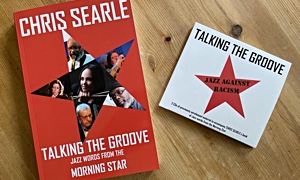Home » Jazz Articles » Book Review » DelightfuLee: The Life and Music of Lee Morgan
DelightfuLee: The Life and Music of Lee Morgan
 DelightfuLee: The Life and Music of Lee Morgan
DelightfuLee: The Life and Music of Lee Morgan Jeffrey McMillan
Cloth/Paper; 272 pages
ISBN: 978-0-472-11502-0/978-0-472-03281-5
University of Michigan Press
2008
This is an excellent, well-written, abundantly researched, scholarly book on the life and music of one of the great, unheralded heroes of jazz—the trumpeter Lee Morgan—who was shot and killed at Slug's Jazz Club in Manhattan in 1972, at the tender age of 33 years, by his 47 year old partner, Helen Morgan (although not legally married to Morgan, she adopted his last name).
Author Jeffrey McMillan, who is also a trumpet player, is obviously smitten by Morgan's music and resilient spirit. His short time on earth was troubled and drug-riddled, but musically fruitful, as McMillan documents. The author, who was aided by Morgan's brother Jimmy, has uncovered information that previous researchers have failed to come up with—like Morgan's precise itinerary, quotations from Helen Morgan, and the fact that Helen's court records are missing. We also learn that Morgan was once legally married to Kiko Morgan (and now we probably know who is getting any royalty checks).
McMillan's only shortcoming is his tendency to give long, detailed analyses of Morgan's recording sessions. These tend to be oriented toward musicians, take up a great deal of the book, maybe a one-third, and read like reviews which would be perfect for a periodical, but are a bit tedious for a book. Yet the biography, despite this, is of abiding interesting and worthy of being in all jazz lovers' libraries—especially, perhaps, of those who could learn not to make the same mistakes Morgan made.
It is clear that Morgan was a rebel with a cause, but one who had a serious flaw that bears careful consideration from other young, up and coming jazz musicians who may be enticed by too much fast living so close to the edge. Morgan's intent, as stated time and time again in the biography, was to use his music to try and soothe the savage beast, in particular society's disrespect for jazz music and jazz musicians, and racial discrimination. DelightfuLee suggests that while Morgan may have very well done that, his use of drugs to escape reality may have diminished his effectiveness. Of course, this is nothing new to jazz history; McMillan is writing about a life style that has been repeated by many other creative people, regardless of color (another example being the white cornetist Bix Beiderbecke).
What is difficult to understand about Morgan's life is his habit of biting the hand that fed him. By most accounts, he was what some on the street call "a greasy junkie," someone who would do almost anything to get his hand on a bag of heroin. McMillan cites an example of this when he mentions the time Morgan and trumpeter Chet Baker purchased some heroin together. When Baker turned his back before they were about to inject themselves, Morgan substituted Baker's shot with water.
Morgan, according to McMillan, made his final mistake when he crossed Helen and began boldly to be seen with another woman, sometimes in Helen's own presence. This would probably cause anyone to snap and lose their sanity. In the end, Helen, whose exclusive interview is included in the book, was, according to McMillan, probably committed to a mental institution, where she had time to think about what she had done not only to Morgan and herself, but also to the wider jazz world.
Helen had silenced the man with the horn who had brought so much joy, innovation and determination to the musical world. McMillan's book convincingly shows that it was a tragedy Lee Morgan couldn't have been around longer, and that there is every reason to think that his future musical endeavors would have been bright and illuminating, and would have uplifted the cultural awareness of his listeners. What a waste, what a sad loss to humanity.
< Previous
Funcall
Next >
Hemispheres
Comments
Tags
For the Love of Jazz
 All About Jazz has been a pillar of jazz since 1995, championing it as an art form and, more importantly, supporting the musicians who create it. Our enduring commitment has made "AAJ" one of the most culturally important websites of its kind, read by hundreds of thousands of fans, musicians and industry figures every month.
All About Jazz has been a pillar of jazz since 1995, championing it as an art form and, more importantly, supporting the musicians who create it. Our enduring commitment has made "AAJ" one of the most culturally important websites of its kind, read by hundreds of thousands of fans, musicians and industry figures every month.























